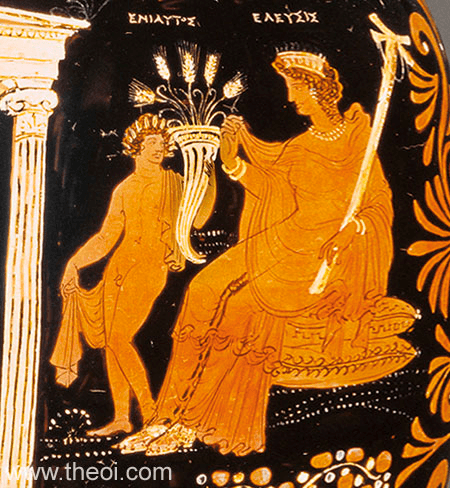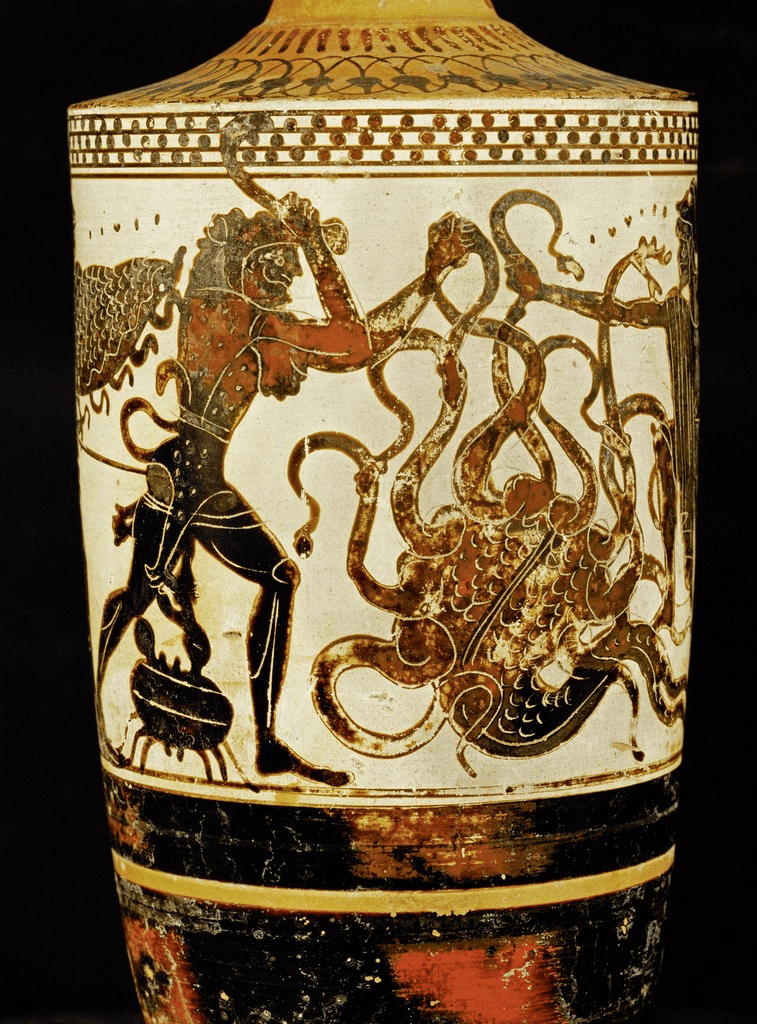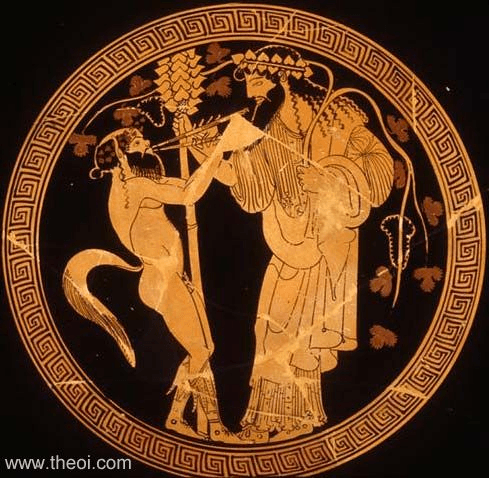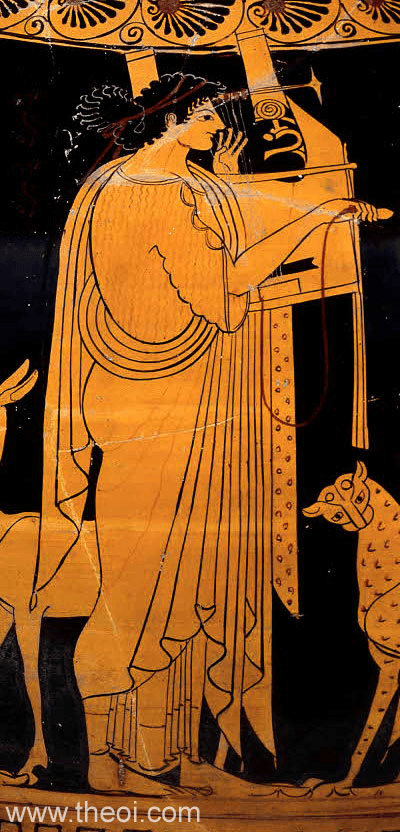These are the two terms that we have used of foundation myths to describe the relationship between a land’s inhabitants and the land itself; the first term describes inhabitants who originate from a different land, and the second term describes people who are indigenous to a particular country or region, and/or are born from the earth.
What are “heterochthonous” and “autochthonous”?
This event leads Achilles to return to the battlefield in the Trojan War.
What is “Hector killing Patroclus”?
This is the Cyclops that Odysseus blinded.
Who is Polyphemus?
“Rage, goddess, sing of the rage of Achilles son of Peleus…It brought the Greeks unceasing grief and sent the souls of thousands of noble warriors to Hades while their bodies lingered for dogs and vultures to devour.”
These are the “author” of this passage and the text that it comes from.
What are Homer and the Iliad?
This is the goddess who appears as an adult woman/matron, and is usually carrying sheaves of wheat or corn, flowers, or fruit.
Who is Demeter?

This is a term meaning “an account or theory of the origin of humanity.”
What is "anthropogony"?
This is the Age of Man in which Hesiod was living.
What is the Iron Age?
Identify the figure pictured below:

Who is Hercules/Herakles?
“Clytemnestra
I do not think
His death shameful.
Did he not use trickery to destroy our house?
Killing Iphigenia, our child, whom I raised
And deeply mourned?
He treated her shamefully,
So shamefully he paid.
He cannot boast in Hades, except that
He killed by the sword, and
So by the sword he died.”
These are the author of this passage and the text that it comes from.
What are Aeschylus and Agamemnon?
(The Oresteia could also be an acceptable answer.)
This is one of the occupations of Hermes/Mercury (multiple possibilities).
What is______(any one of the following: messenger of the gods, psychopomp, trickster)?
This Greek term means “a journey home,” or a “homecoming.”
What is a "nostos"?
In Apuleius’ “Cupid and Psyche,” this event caused Cupid to become angry at Psyche and run away from her.
What is "Psyche's attempt to see Cupid's face while he slept"?
The Judgment of Paris involved these three goddesses.
Who are Hera, Aphrodite, and Athena?
“I sing of arms and the man, he who, exiled by fate, first came from the coast of Troy to Italy, and to Lavinian shores – hurled about endlessly by land and sea, by the will of the gods, by cruel Juno’s remorseless anger, long suffering also in war, until he founded a city and brought his gods to Latium: from that the Latin people came, the lords of Alba Longa, the walls of noble Rome.”
These are the author of this passage, the text that it comes from, and the person it is referring to.
What are Vergil, the Aeneid, and Aeneas?
This is the figure (on the right) depicted below:
Who is Dionysus/Bacchus?
This term refers to “gods who dwell on, in, or beneath the earth.”
What is “chthonian”?
Name the author and play that describe the incident in which Agamemnon sacrifices his daughter to ensure that the Greek army can sail to Troy.
Who is Euripides, and what is "Iphigeneia in Aulis"?
These are Zeus’ parents.
Who are Kronos (or Saturn) and Rhea?
This is the work from which the following passage has been taken:
“But upon [REDACTED] herself Zeus cast sweet desire to be joined in love with a mortal man, to the end that, very soon, not even she should be innocent of a mortal's love; lest laughter-loving [REDACTED] should one day softly smile and say mockingly among all the gods that she had joined the gods in love with mortal women who bare sons of death to the deathless gods, and had mated the goddesses with mortal men.
And so he put in her heart sweet desire for Anchises who was tending cattle at that time among the steep hills of many-fountained Ida, and in shape was like the immortal gods.”
What is the Homeric Hymn to Aphrodite?
Identify at least TWO domains of the god pictured below (multiple possibilities).

What are: Music, Prophecy, Healing, the Sun?
This term describes a character in myth or legend who enables or facilitates human civilization by such actions as overcoming monsters, acquiring elements (fire, water), and imparting knowledge; importantly, they usually ADD or SUBTRACT something from the human experience.
What is a Culture Hero?
This is the event by which Zeus breaks the “succession cycle,” or cycle in which sons overthrow their fathers, in Hesiod’s Theogony.
What is the Birth of Athena?
In the Trojan War, these are the name of a deity on the Greek side and the Trojan side, respectively (multiple possibilities).
Who are _______(Athena, Hera, or Thetis) and __________(Aphrodite, Apollo, or Ares)?
These are the author and title for Passages A and B, respectively.
PASSAGE A:
“...Then [Zeus] told renowned Hephaistos to quickly moisten earth with water, and to put in it the voice and strength of a human, and to make its face like those of the immortal goddesses: the beautiful, desirable form of a maiden. And he told Athena to teach her skills, to weave a very intricate cloth; and Aphrodite to pour grace around her head, and painful desire and paralyzing cares; and he urged Hermes, the envoy, slayer of Argos, to put in it a bitchy mind and a cunning character.
So he spoke, and they obeyed him, Zeus, the lord, son of Kronos. And at once, out of dirt, the famous Lame One modeled the likeness of a modest maiden, according to the plans of Kronos' son. The bright-eyed goddess, Athena, girdled her and adorned her… And then into her breast the envoy, slayer of Argos, placed lies and flattering words and a cunning character, according to the plans of loud-thundering Zeus. And so a voice he put into her, the herald of the gods, and this woman he named Pandora (All-Gifted), since all who have mansions in Olympos gave her gifts, a sorrow for bread-eating men.
After he had completed the utter, impossible deception, the father sent the famous slaver of Argos to Epimetheus, carrying the gift … and Epimetheus did not consider that Prometheus had told him not ever to accept a gift from Olympian Zeus, but to send it back, lest somehow some evil befalls mortals. Only after he had received it, when he had the evil, he understood.
For before this the tribes of men used to live far apart from evils and apart from harsh pains and from distressful diseases, which now give death to men. But the woman scattered them, after she lifted the great lid of the jar with her hands. And so she conceived miserable sorrows for humankind…”
PASSAGE B:
“But at once he prepared an evil for humanity, in exchange for the fire; for the very renowned Lame one (Hephaistos) fashioned from earth the likeness of a maiden, by the plans of the son of Kronos, and the goddess of bright eyes, Athena, girded her and adorned her, with a silvery dress, and with her own hands she hung down fromn her head an embroidered veil, a marvel to see. And around her temples Pallas Athena placed lovely flourishing garlands, flowers from the meadow. And around her head she placed a golden headband, which the very renowned Lame one had made with his own hands, to please the father Zeus…
But once he made a beautiful evil thing to pay for the good one he took her where the other gods and human beings were, embellished with the adornment of the bright-eyed one, fathered by a mighty one; and wonder possessed both immortal gods and mortal men, when they saw the thorny deception, irresistible for men. For the race of female women springs from this one, for from her is the destructive race and tribe of women, a great pain for mortals, dwelling together with men, no companions in destructive poverty but only in wealth…”
What is ... ?
(Passage A) Works and Days, by Hesiod
(Passage B) Theogony, by Hesiod
This is the figure from classical mythology who has been drawn on the board.
(A group, consisting of one member of each team, will go outside and be given a name (this name must not be spoken; it will be as secret as the Eleusinian Mysteries, known only to the initiates). They'll then have a little time to discuss and, upon their return, will draw the given character on the board.)
Who is Athena/Minerva?